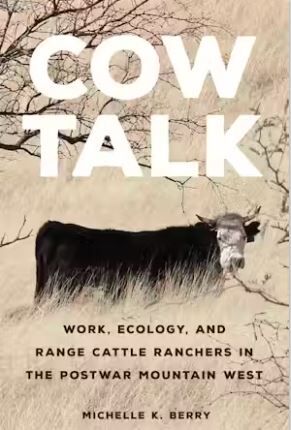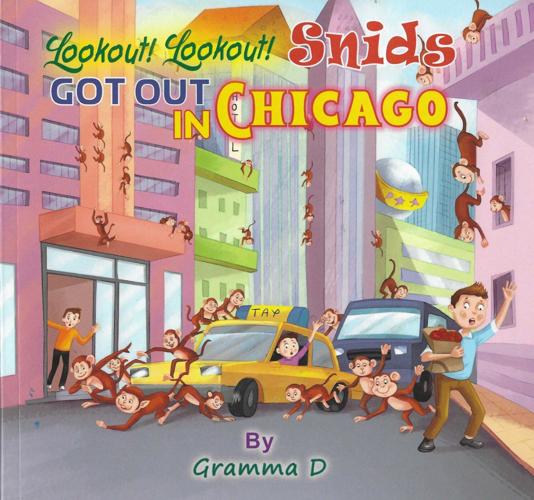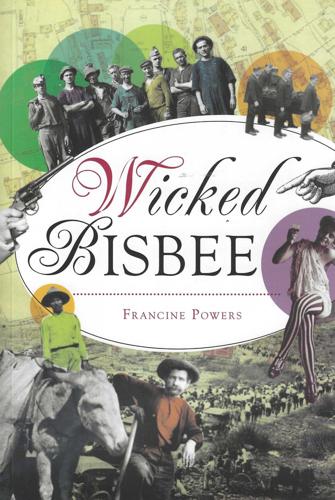“Cow Talk: Work, Ecology, and Range Cattle Ranchers in the Postwar Mountain West” by Michelle K. Berry. University of Oklahoma Press. $65; $29.95 paperback; Kindle $24.95

Growing up in rural western Colorado, Michelle Berry was well aware of the Sagebrush Rebellion and the struggle over public lands. But the Rebellion’s roots were elusive and prompted her, as an environmental historian, to take a deep dive into 20th century ranching history — specifically, the years between 1945 and 1965, the two decades she identifies as the turning point during which ranchers came together to protect a way of life they viewed as increasingly under attack.
Perhaps unsurprisingly, there were no tidy explanations — she found no history focused solely on this group of agriculturalists. Rather, what she discovered were patterns illustrating how unaffiliated cowboys cultivated a group identity and coalesced over time into a powerful — and increasingly volatile — political entity. “Cow Talk” — the rancher equivalent of shop talk — was at the heart of the group’s identity, providing both a shared language and a communal cause, and it’s the common thread, the author says, that wove together the disparate ecological and cultural experiences the ranchers used to celebrate their heritage, reinforce their values and identify threats to their way of life.
That this is a deeply researched, voluminously foot-noted, academic volume does not make it any less fascinating; it is accessible, masterfully organized, and provides a clear-eyed analysis of the evolution of a critical political force. Berry is an assistant professor in Gender and Women’s Studies at the University of Arizona, and co-author of “A Primer for Teaching Environmental History: Ten Design Principles.
— Helene Woodhams
“Lookout! Lookout! Snids Got Out in Chicago” by Gramma D. Illustrations by Blueberry Illustrations. Independently published. 28 pages. $9.95; Kindle $5.99

Kids ages 5-11 who like rambunctious read-alouds will welcome the return of the Snids, miniature-sized gremlins who wreak havoc wherever they go — and it seems they go everywhere. In this third outing for the Snids, author Gramma D unleashes her tiny terrorists on Chicago. Their first stop is the Lincoln Park Zoo, where they release the denizens of the primate house and city-wide monkey business ensues.
With her picture books, Gramma D (known to her Tucson neighbors as Frenchy Dennis) says she aims to fire up kids’ imaginations and make them laugh. With clever rhymes and hilarious illustrations, she succeeds admirably. Bonus coloring pages add to the fun.
— Helene Woodhams
“Mr. Ricky’s Life of Logic: A taxi-driver’s pathway to a better life for all” by Evan Phillips. Independently published. 212 pages. $9.99; Kindle $5.99

At first glance, Mr. Ricky is a talkative cab driver, ferrying tourists around the idyllic St. Thomas in the U.S. Virgin Islands while engaging them in conversation. Politics, taxes, religion, education — no timely topics are off-limits to this well-spoken, philosophical cabbie.
But as the narrative unfolds, it becomes clear that Mr. Ricky has hidden depths and an agenda to match. We’re socialized from childhood to feel about things in certain ways, he says, and they’re not always the best ways. Why should that be? Many societal rules are irrational, and people could lead happier, more productive lives if they thought through their biases and beliefs logically. Mr. Ricky has a plan for that, and it’s gathering adherents on the island.
In this personal ideology wrapped lightly in a novel, author Evan Phillips recalls Voltaire, who said that those who can make us believe absurdities can make us commit atrocities. Can logic supplant deeply-entrenched, absurdist thinking? The author, a self-confessed optimist, believes it can. Phillips was born in British Guiana (now Guyana), attended college in the U.S. on a tennis scholarship, and has been a tennis pro in both St. Thomas and in Tucson, as well as an English teacher at the high school and college levels.
— Helene Woodhams
“Wicked Bisbee” by Francine Powers. The History Press. 144 pages. $24.99; Kindle $8.99

This slim volume of bite-sized offerings highlighting the lowlights, lowlifes and general mayhem of Bisbee’s wicked past begins with the founding of Bisbee’s library. No kidding.
Justice was delivered swiftly to the inebriated stranger who shot up the Bon Ton Saloon: he was hanged from an oak tree, his body left swinging as a cautionary message to others with similar antisocial tendencies. As luck would have it, two directors of the Copper Queen Mine Company, just arrived from New York, were horrified by the spectacle. Hurrying to board the next New York-bound train, they determined that Bisbee needed some culture to offset its general lack of refinement. Their solution was to send hundreds of books to Bisbee, which were housed in a corner of the local mercantile; the Copper Queen Library was born.
Author Francine Powers, an award-winning reporter who has made Bisbee her beat, has an uncanny knack for digging up weird, wild and wooly stories. From calamities, race riots and painted ladies to a hard-drinking black bear, Powers has a keen eye for uncommon anecdotes. The former owner of Bisbee Haunted Historical Tours, she is also the author of “Haunted Bisbee,” “Haunted Cochise County,” and a children’s book, “Ghostly Tales of Bisbee.”
— Helene Woodhams
“The Army You Have: Operation Iraqi Freedom — A Military Intelligence Soldier’s Perspective” by Sara Fleming. Wheatmark. 310 pages. $15.95 paperback; $9.99 digital

This memoir deserves a movie. A documentary. And Donald Rumsfeld might not enjoy it.
Connecticut-raised Sara Fleming needed to pay off undergrad student loans back in 1999, and she wanted to attend graduate school at the University of Arizona. To accomplish both, she joined the Army Reserve as a military intelligence soldier. All, unfortunately, did not go smoothly. It started out well: on her first deployment, to Kosovo, she proved a respected noncommissioned officer tasked with analyzing human intelligence. But then George Bush declared war on Iraq.
As Fleming experienced it, the Iraq War was both misguided and mismanaged. She and her reservist unit were sent to Kuwait, and then to Iraq. Not only were they ill-trained and unequipped for the brutal Middle Eastern environment, but they as reservists were disrespected by the active-duty troops. When they arrived, their luggage was months behind; they had no body armor, and they had no functioning radios or phone, GPS capacity for vehicles, or ammunitions. They were assigned a former landfill on which to pitch their tents and spent interminable days sitting and waiting for assignments. As time wore on, Fleming and her Bravo unit (“The Bandits”) grew maddeningly more frustrated with the senselessness of their mission, the mindless regulations of the military, and officials’ callous disregard for civilians in the land they’d invaded, and, while they maintained the integrity of their own work, they began dismissing regulations at will.
Fleming fills this book with detail — from dangerous, open-air drives through blistering Iraqi heat and threatening crowds, and officers’ volunteering their unit for hazardous duty to gain career promotion, to comradeship forged through adversity and friends’ deaths. Winfred Owen’s “Dulce et Decorum Est” comes to mind.
Hers is an unforgettable account, worth reading for its own sake, but also as a cautionary tale — a reminder of unnecessary destruction that can result from one pathetic leader’s hubristic, unfounded invasion of a sovereign country.
— Christine Wald-Hopkins
“Discovering Something Greater: Find Joy, Purpose, and Fulfillment on Your Terms” by Kimberly Crossland, Mary Reiss Farias, Kristin Gudenkauf and Casie Rendon. IrisBlu Publishing. 233 pages. $19.99

Not necessarily apparent from its title, this is a book on entrepreneurship. Co-authored by four mother-entrepreneurs, it’s presented as a casual, here’s my experience, let’s-talk-about-this-over-coffee, how-to. Children’s book publisher Kristin Gudenkauf, former gymnast, coach and gym owner Mary Reiss Farias, wellness educator Casie Rendon, and RV blogger and entrepreneur Kimberly Crossland individually write about vision, self-image, balance and finding voice. The book concludes with observations from the group and lessons on entrepreneurs’ need for resilience.
— Christine Wald-Hopkins
“The Other Side/El Otro Lado” written and illustrated by Rebecca Wilder. Independently published. 38 pages. $29.99. Available at Antigone Books, 411 N. Fourth Ave., and Petroglyphs, 160 S. Avenida del Convento.

In fewer than 40 pages (and just enough words) Tucson writer, artist and restaurateur Rebecca Wilder presents an aesthetically appealing, affecting and culturally acute tale set in our Sonoran Desert borderlands. Two voices — a woman’s in English and a man’s in Spanish — tell of traveling alone along a deserted desert highway on a cold winter night. The woman is in a car; the man is on foot, pushing a tire. He clearly needs help, but dare she give him a ride?
Wilder’s 15 illustrative paintings are stunning — vibrant landscapes, night skies and cosmos — that get richer and more intense as the story unfolds. It’s suitably dedicated to her Nogales father “who lived gracefully in both worlds.”
— Christine Wald-Hopkins
“The Story of Brimstone Anderson — An Asian Dragon” by L.J. Garrod. Independently published. 350 pages. $9.75 paperback; $4.99 Kindle

After a prologue in which a 19th-century Chinese worker hides his home village’s “treasure” in a volcanic hot spot in the Jemez Mountains, a 21st-century New Mexico kid discovers a newly-hatched dragon at that very spot. The size of a ping-pong ball, bright yellow with turquoise freckles, it crawls up the kid’s arm and wins both the kid’s and the reader’s hearts.
The dragon, which the kid (Luke)’s family names Brimstone, doesn’t stay tiny long, but he does remain winning. Polite, sympathetic, trainable and smart: though mute, he quickly learns English; and then — with the help of teachers and neighbors — learns to speak and sing. And therein lies danger: the more people who know about a neighborhood dragon, the greater the threat to him — paparazzi. Fortune-seekers. The US government. Luke and his family will need to fight to protect their adopted not-so-aprochryphal beast.
This novel, by Tucsonan Lorna J. Garrod, is targeted to 8- to 18-year-olds, but is probably best for 8 to 12 — and then older folks who like sweet stories. That includes this reader. And, not to spoil plot, but the lurking fear of a “Puff the Magic Dragon” outcome thankfully doesn’t pan out.
— Christine Wald-Hopkins











